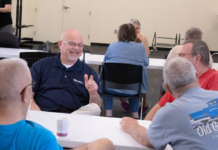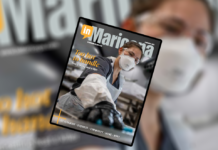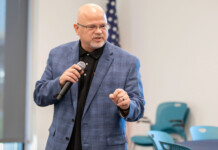
Passion is an amazing thing. It motivates, produces results and directs focus. It bolsters words, actions and tenacity, spurring us on to accomplish so much more than arbitrary or capricious limitations would indicate. Passion drives us to be and do our best, and it’s alive and well in Maricopa.
In a few short weeks voters will either pass or defeat Question #5 – the City’s $65.5 million bond issue. There will be many who don’t vote at all, nullifying any voice or choice they have. But those who vote do so because, more often than not, passion warrants action.
In recent weeks Question 5 has generated numerous comments and impassioned dialogues both for and against. It has sparked considerable debate and deliberation in local newspapers, on Internet forums, and just about everywhere people gather. It’s become one of Maricopa’s hot topics, and that’s a good thing. Hopefully, it will prompt more people to vote.
Proponents and opponents have expressed valid, convincing and salient points on the mechanics and merits of Question 5. Some suggest we take the “remember when…” route, comparing previous economic experiences to today’s circumstances, feeling confident that now is the time to act because things will get better. Those looking ahead to the future feel positive in a “if you build it, [they] will come” approach. There are those who believe it’s more prudent to take a conservative course, pursuing projects in controlled stages when conditions improve. Others remind us that many people are “maxed-out” financially and this is not the time to approve a long-term proposition that brings higher property taxes down the road. No one makes any promises or gives any guarantees. If they could, it would make things a whole lot easier.
Right now, the only certainty is things change. They may improve, they may get worse, but change is inevitable. Who could have predicted the incredible number of foreclosures across the country and in our own neighborhoods, people literally abandoning homes they likely couldn’t afford in the first place, builders barely keeping up with new construction one minute and going belly-up the next, a multi-billion-dollar government bail-out to fix a “no homeowner left behind” concept? If we’d only known then what we’re seeing now. Talk about things getting “super-sized!”
I realize there’s a prudent and appropriate time to incur debt for something worthwhile, something you want or need. Several mortgages, a few well-used credit cards, wise investments and adherence to the basic principles of sound financial management have taught me to be a conscientious consumer. As a consumer, taxpayer and Maricopa resident working to make a positive difference, I have read and learned much on the elements of Question 5. I’m respectful of everyone who has taken time to share perspectives. I appreciate those who offer ideas or alternatives. It helps me, and hopefully others, to be more aware and better informed.
One extremely important thing to remember is that the City would approve issuing bonds over time and only if the budget supports that step. The $64,000-dollar (or in this case $65.5 million-dollar) question is…will it?
· FY2009 annual budget goals call for issuing 100 building permits per month, which in turn generate DIFs (Development Impact Fees), a goal we may not / probably won’t reach given current indicators. What happens then?
· Attracting new business to Maricopa is a painfully slow, arduous process. Maricopa offers much potential, but development is highly competitive, and growth is limited by lending restrictions and conservative expansion postures on the part of those we’re trying to attract. How does that impact our economy, our city?
· Council agendas in the past several months have included multiple requests for approval to seek grant money on a variety of projects because we don’t have the financial resources to otherwise provide them. If we don’t get these grants, these projects don’t happen. Grants are an invaluable funding alternative and are worth pursuing, but it also reinforces the fact that we’re facing significant challenges when it comes to funding essential / desirable products and services. How long can we rely on grants? What happens once the grant money is gone?
· Building more homes continues to be a focus. The City is fast-tracking the permit process and bending over backward to accommodate builders. Trouble is, these could be / are the same entities who build one day and either leave Maricopa, downsize or go under the next. Canterra, Engle, Elite, Frontier, Hacienda, HallCraft, Lennar… it’s a growing list. What are the options for those waiting to move into these unfinished homes? What happens when builder subsidies stop or these companies declare bankruptcy? How much more do existing homeowners have to pay to their Associations when construction stalls or stops entirely? Who wants month after month of dirt, weeds and vermin for neighbors?
· City personnel have spent significant time and effort putting together a foreclosure workshop because there’s a real need. Wouldn’t it be great if we could also have an “Understanding Municipal Bonds 101” seminar?
· What’s the “bottom line?” There have been a lot of opinions, conjecture and assumptions, as well as some qualified projections from individuals closer to Maricopa’s financial status than most of us. Even so, we still don’t have a comprehensive, “hard numbers” budget perspective. The Council agenda for October 21 is supposed to include a financial update through the third quarter. We need to pay close attention to that report.
This November’s election is extremely important. Key decisions will be made that will be felt from the White House to your house. Our collective choices will impact this country, this county and this city socially, legislatively and economically.
Locally, we also have to consider Question 1, a request for approval to issue $98.9 million in bonds for improvements and expansion at the community college level. Either way, that’s going to have a direct impact in Maricopa.
For me, the bottom line is that Question 5 presents a risk I’m not willing to take right now, even if it means postponing or doing without facilities that are without a doubt worthwhile. I’m not convinced we need to approve a way now for Council to move ahead over the coming years on the entire proposal, especially one with so many components. I’m not sold on the notion that if it’s not approved in 2008 it’ll take years to make something happen. I feel we have alternatives, and the only thing lost by being conservative is a chance. Things change; opportunities and chances come again.
For a lot of people, regardless of age, income level and personal preference with regard to the merits of Question 5, it comes down to this… Why should I focus on and commit my future fixed income to one piece of a very large, complex, ever-changing puzzle and agree to increase future taxes on a huge “all or nothing” spending initiative when I’m not convinced I should?
That’s why I’m voting ‘no’ on Question #5.
Thank you, Peggy Chapados
Peggy Chapados is retired and a resident of The Villages at Rancho El Dorado. She is a member and co-founder of the Maricopa HOA Presidents’ Group and an active member of the community. She currently serves as Board President of The Villages HOA, Vice-Chair of the City of Maricopa Public Safety Advisory Committee and is a graduate of the City’s inaugural Maricopa Citizens’ Leadership Academy.
File photo











![Gila River Bridge construction to begin Monday A screenshot showing an aerial view of the current Gila River bridges on Interstate 10 on an unknown date. [Arizona Department of Transportation]](https://www.inmaricopa.com/wp-content/uploads/2024/05/Screenshot-2024-05-10-154035-218x150.png)

![Build to rent community nears construction completion Crews finish work on the entrance to the Hampton Edison build-to-rent community on Edison Road and Wilson Avenue on May 16, 2024. [Monica D. Spencer]](https://www.inmaricopa.com/wp-content/uploads/2024/05/spencer-051624-hampton-edison-nears-completion-web-01-100x70.jpg)
![Documents, donations doubled over last year’s Shred-A-Thon Volunteers of the Senior Advisory Committee fill a trash bin with documents to be shredded during the committee's sixth annual Shred-A-Thon at Copper Sky Regional Park on April 22, 2024. [Pinal County Attorney's Office]](https://www.inmaricopa.com/wp-content/uploads/2024/05/pcao-042224-shred-a-thon-100x70.jpg)

